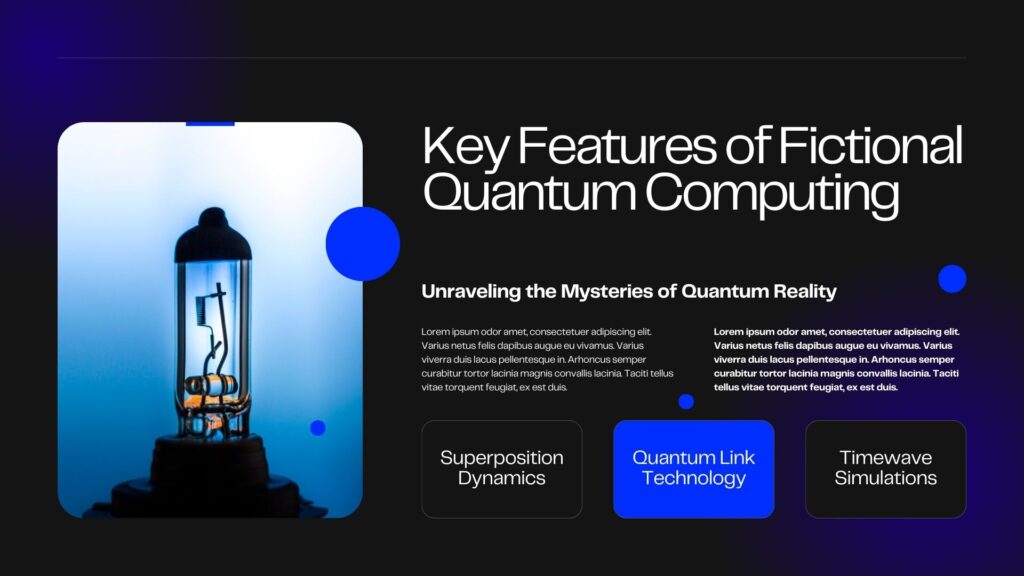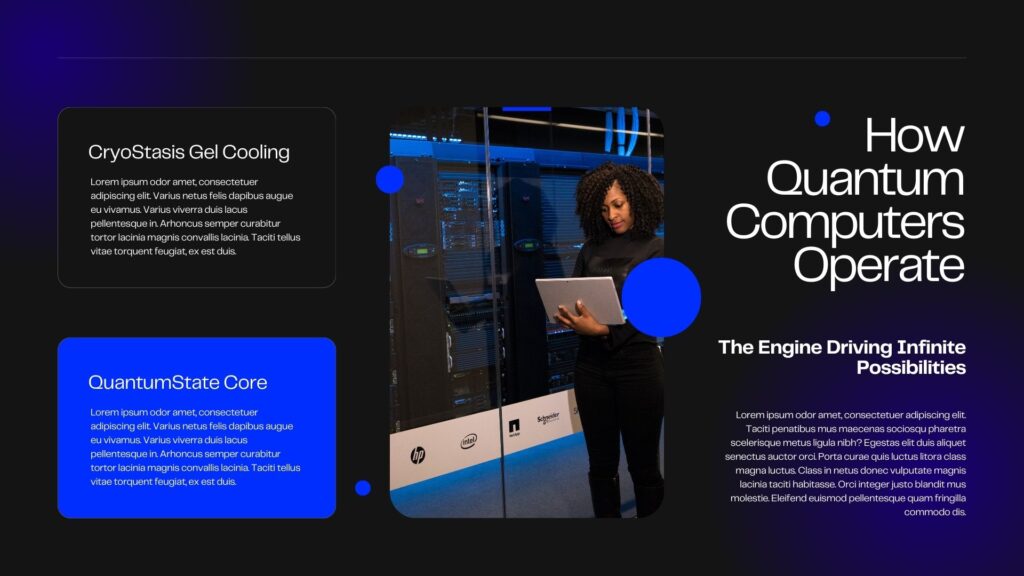Introduction to Quantum Computing
Technology has always pushed the boundaries of what humans can achieve. From the invention of electricity to the rise of the internet, each leap forward has reshaped the way we live, work, and interact. Now, another groundbreaking shift is emerging: quantum computing.
Unlike traditional computers that process information in bits (either 0 or 1), quantum computers use qubits, which can exist in multiple states simultaneously. This property, known as superposition combined with entanglement and quantum tunneling, allows quantum computers to solve highly complex problems at speeds unimaginable for classical machines.
The global race for quantum supremacy is heating up. Tech giants like Google, IBM, and Microsoft are investing heavily, while startups and governments are pouring billions into research. Google’s Sycamore processor famously demonstrated “quantum supremacy” in 2019 by solving a problem in minutes that would take classical supercomputers thousands of years.
But beyond scientific milestones, the real question is: how will quantum computing shape our future?
1. Revolutionizing Artificial Intelligence (AI)
In this article, we’ll explore seven major impacts of quantum computing on future technologies, spanning from artificial intelligence and cybersecurity to healthcare and even space exploration.
Artificial Intelligence (AI) thrives on data. From self-driving cars to advanced medical diagnostics, AI systems require massive computational power to train models and process enormous datasets. Even with today’s most advanced GPUs, training deep learning models can take days, weeks, or even months.
This is where quantum machine learning (QML) comes in. By leveraging quantum algorithms, AI systems can analyze complex datasets exponentially faster. Quantum computers can process multiple possibilities simultaneously, drastically reducing training times and improving accuracy.
Key Benefits of Quantum AI:
- Faster model training: What takes weeks on classical systems could take hours on quantum systems.
- Better pattern recognition: Useful for speech recognition, fraud detection, and predictive analytics.
- Enhanced robotics: Robots could process sensory data in real-time with improved decision-making.
Real-World Examples:
- Google’s TensorFlow Quantum integrates quantum computing with AI frameworks.
- IBM’s Qiskit Machine Learning provides open-source tools for quantum-enhanced ML experiments.
- Healthcare startups are already testing quantum-powered AI to analyze genetic data and detect diseases earlier.
In the near future, imagine a virtual assistant that doesn’t just respond to your questions, but predicts your needs with near-perfect accuracy. Or a financial AI that identifies stock market trends in real-time with unmatched precision.
Read More: EXPLORE THE FUTURE OF AI WORD
2. Transforming Cybersecurity
Every digital transaction today, whether sending an email, making a bank payment, or signing into a website, relies on encryption. Most of this security is based on mathematical problems (like factoring large prime numbers) that are difficult for classical computers to solve.
But quantum computers change the game. Using Shor’s Algorithm, a sufficiently powerful quantum computer could break widely used encryption standards such as RSA and ECC within seconds. This means that much of today’s internet security could become obsolete almost overnight.
The Risks:
- Online banking systems, government communications, and even blockchain could be vulnerable.
- Sensitive personal data could be exposed if encryption methods aren’t upgraded.
The Solutions:
- Quantum-Safe Encryption: Researchers are developing new cryptographic algorithms designed to withstand quantum attacks. The U.S. National Institute of Standards and Technology (NIST) is leading the effort in standardizing post-quantum cryptography.
- Quantum Key Distribution (QKD): Instead of relying on mathematical problems, QKD uses the laws of physics to secure communications. Any attempt to eavesdrop changes the quantum state, immediately alerting both parties.
Real-World Progress:
- In 2020, China launched the world’s first quantum communication satellite (Micius), enabling ultra-secure quantum messaging.
- European countries are testing QKD networks for government and financial systems.
The future of cybersecurity will not just involve stronger firewalls or complex passwords—it will be quantum-proof security.
3. Accelerating Drug Discovery and Healthcare
Developing a new drug can take over a decade and cost billions of dollars. The main reason is the complexity of molecular interactions. Classical computers struggle to simulate these interactions accurately, meaning researchers often rely on trial and error in laboratories—a slow and expensive process.
Quantum computing can change this by simulating molecular structures at the atomic level. By modeling chemical reactions in their true quantum nature, researchers can identify promising drug candidates much faster.
Potential Benefits in Healthcare:
- Faster Vaccine Development: Imagine how much quicker COVID-19 vaccines could have been developed with quantum-powered simulations.
- Personalized Medicine: Quantum computers could analyze an individual’s genetic makeup to design tailored treatments.
- Lower R&D Costs: Faster simulations mean reduced laboratory testing and fewer failed experiments.
Industry Adoption:
- Roche and Biogen are exploring quantum computing for complex molecular research.
- Startups like ProteinQure are using quantum algorithms to design next-generation drugs.
- Hospitals could one day use quantum-powered diagnostic tools to detect diseases at extremely early stages.
Quantum computing won’t just save money it could save lives by making healthcare more precise, affordable, and accessible.

4. Boosting Financial Modeling
The financial world runs on data. Whether it’s predicting market trends, detecting fraud, or managing risk, banks and investment firms process trillions of transactions daily. Classical computers already struggle with the sheer volume and complexity of these calculations, often requiring massive data centers to keep up.
Quantum computing could revolutionize the financial sector by delivering unparalleled modeling and forecasting capabilities.
Key Applications in Finance:
- Risk Management: Quantum algorithms can analyze thousands of risk factors at once, helping banks better prepare for market crashes or global recessions.
- Trading Optimization: Hedge funds could run millions of trading simulations instantly, fine-tuning strategies for maximum returns.
- Fraud Detection: Quantum machine learning can detect subtle anomalies in massive datasets, catching fraudulent transactions more effectively.
- Portfolio Management: By processing complex financial data, quantum systems can suggest optimized asset allocations tailored to investor goals.
Real-World Progress:
- Goldman Sachs is collaborating with quantum companies to explore portfolio optimization.
- JPMorgan Chase is experimenting with quantum algorithms for risk analysis and fraud detection.
- Barclays has tested quantum-based models for pricing financial derivatives.
The result? A financial system that’s faster, safer, and far more precise. Investors could benefit from more accurate predictions, while customers enjoy enhanced fraud protection.
5. Advancing Climate and Weather Predictions
Predicting the weather may sound simple, but in reality, it requires crunching billions of variables—from air pressure and humidity to ocean currents and solar activity. Even the world’s most powerful supercomputers cannot simulate the Earth’s climate with perfect accuracy.
Quantum computing could change this by allowing researchers to build incredibly detailed climate models. With the ability to simulate complex systems at scale, quantum technology will enhance our understanding of global warming, extreme weather, and natural disasters.
Potential Benefits:
- Accurate Weather Forecasting: Farmers could get more reliable forecasts for planting and harvesting seasons.
- Disaster Preparedness: Governments could better predict hurricanes, floods, or droughts, saving lives and reducing economic damage.
- Climate Change Research: Quantum-powered models can help scientists simulate the long-term impact of greenhouse gases with greater precision.
- Sustainability Planning: Businesses can use climate predictions to reduce waste, save energy, and build eco-friendly infrastructure.
Industry Examples:
- The European Centre for Medium-Range Weather Forecasts (ECMWF) is testing quantum methods for weather predictions.
- IBM’s climate research team is experimenting with quantum-powered environmental models.
In a world facing climate change, quantum computing could become one of our most powerful tools for sustainability.
Read More: What Is Quantum Computing? | IBM
6. Revolutionizing Logistics and Supply Chains
Behind every online purchase, international shipment, or airline route lies a highly complex logistics network. Optimizing these networks—choosing the best routes, minimizing fuel usage, and reducing delivery times—is an incredibly difficult challenge.
Classical algorithms can handle some of these problems but often fall short when faced with millions of possibilities. Quantum computing, however, can analyze countless variables simultaneously, making it ideal for logistics optimization.
Key Applications:
- Route Optimization: Delivery companies like DHL and FedEx could minimize delays and fuel consumption.
- Airline Scheduling: Quantum computers can optimize flight schedules, reduce congestion, and cut operational costs.
- E-commerce Fulfillment: Retail giants like Amazon and Walmart can manage warehouse operations and supply chains more efficiently.
- Sustainable Transportation: By reducing unnecessary fuel usage, quantum optimization contributes to greener logistics.
Real-World Progress:
- Airbus is exploring quantum computing for flight path optimization.
- Volkswagen tested a quantum-based traffic flow management system in Beijing, successfully reducing congestion.
- DHL has partnered with quantum firms to improve shipping logistics.
In the future, your online orders could arrive faster, cheaper, and with a smaller carbon footprint—all thanks to quantum-powered logistics.
7. Accelerating Space Exploration
Space exploration has always required advanced computing power. From plotting spacecraft trajectories to analyzing vast amounts of astronomical data, traditional systems often push their limits.
Quantum computing could unlock entirely new possibilities for space science.
Key Applications in Space:
- Trajectory Optimization: NASA could plan more fuel-efficient paths for missions to Mars or the Moon.
- Astrophysical Simulations: Quantum systems can simulate black holes, dark matter, and other cosmic phenomena with unprecedented accuracy.
- Satellite Optimization: Better scheduling and routing of satellites for communication and GPS systems.
- Data Processing: Astronomical observatories collect petabytes of data daily; quantum computers can process this much faster.
Real-World Examples:
- NASA’s Quantum Artificial Intelligence Laboratory (QuAIL) is actively researching quantum solutions for space applications.
- The European Space Agency (ESA) is testing quantum communication technologies for secure satellite transmissions.
With quantum computing, humanity could solve the computational challenges of interplanetary travel and take giant leaps toward becoming a multi-planetary species.

Challenges & Limitations of Quantum Computing
While the potential of quantum computing is enormous, the technology is still in its infancy. There are significant challenges that need to be addressed before quantum computers can become mainstream.
1. Technical Challenges
- Qubit Stability: Qubits are extremely fragile and prone to errors from noise and temperature fluctuations.
- Error Correction: Current quantum systems require thousands of physical qubits to create a single stable logical qubit.
- Hardware Limitations: Building large-scale, commercially viable quantum computers is still years away.
2. Economic Challenges
- High Costs: Developing and maintaining quantum systems is incredibly expensive.
- Unequal Access: Tier-1 countries (like the US and UK) are leading research, while many developing nations may lag behind.
3. Ethical & Security Concerns
- Cybersecurity Risks: Until post-quantum cryptography is widely adopted, sensitive data remains vulnerable.
- AI Misuse: Quantum-enhanced AI could be exploited for malicious purposes if not regulated.
These challenges highlight that while quantum computing is promising, it must be developed responsibly and collaboratively.
Future Outlook: When Will Quantum Computing Go Mainstream?
So, when will quantum computing become part of our everyday lives? Experts suggest that the 2030s could be the decade when industries begin widespread adoption.
- Short Term (2025–2030): Pilot projects in healthcare, finance, and logistics.
- Medium Term (2030–2035): Widespread use in government, defense, and space agencies.
- Long Term (2035+): Quantum integration into consumer technologies, possibly transforming smartphones, AI assistants, and personal computing.
Just like the internet in the 1990s, quantum computing will gradually move from labs to industries—and eventually into our homes.
Read more: What is quantum computing?
Frequently Asked Questions (FAQs)
Q1. What is quantum computing in simple words?
Quantum computing is a new type of computing that uses qubits instead of bits. Unlike normal bits that can be 0 or 1, qubits can be both at once, allowing for much faster and more powerful calculations.
Q2. Will quantum computers replace classical computers?
Not entirely. Quantum computers are designed for specific complex tasks. Classical computers will still be used for everyday tasks like browsing, gaming, and word processing.
Q3. How will quantum computing affect jobs?
Quantum computing will create new jobs in research, software development, cybersecurity, and AI. However, it may also disrupt industries like banking, logistics, and IT security, requiring professionals to reskill.
Q4. Which companies are leading in quantum computing?
Major players include Google, IBM, Microsoft, Amazon, D-Wave, Rigetti, and IonQ. Governments in the US, UK, China, and EU are also heavily investing.
Q5. Is quantum computing dangerous?
Like any technology, quantum computing has risks particularly in cybersecurity. However, researchers are actively developing quantum-safe encryption to protect sensitive data.
Q6. When will quantum computing be available to the public?
Currently, access is limited to researchers and organizations via cloud platforms like IBM Quantum Experience. Consumer-level quantum computing is still at least 10–15 years away.
Conclusion
Quantum computing represents one of the most exciting technological revolutions of our time. From revolutionizing AI to transforming cybersecurity, accelerating drug discovery, boosting financial systems, advancing climate research, optimizing logistics, and accelerating space exploration, its potential impacts are far-reaching.
Yet, challenges remain qubit stability, high costs, and ethical risks must be addressed before the technology becomes mainstream.
Just as the internet transformed the 20th century, quantum computing could reshape the 21st. The industries that prepare now will be the ones leading in the quantum-powered future.

